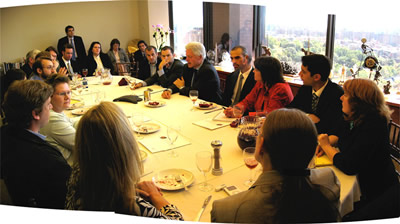This passage on Singapore didn't make it into Chapter 11 for
reasons to do with flow.
If matters appear relatively clear cut in China, they are less so in
nearby Singapore, where the contradictions of a state-driven high-tech
economic development strategy and authoritarian rule may soon begin to
intensify. Given an economic context of declining manufacturing growth
rates in the 1980s, Singapore implemented a national information
technology plan, aimed at developing a modern communication
infrastructure based on fibre optic backbones, and the development of an
entrepreneurial culture of innovation in the high-tech sector. Economic
development in this area was also spurred by the early and widespread
adoption of new ICTs in government as well as a new agenda for the
teaching of IT skills in universities. All of these initiatives were
designed with economic development in mind, and they have proved
successful in these terms (Ho et al, 2002: 127, 143).
Singapore is best described as semi-authoritarian, and is widely
regarded as one of the most surveilled societies in the world (Kalathil
and Boas, 2003: 74). Since its founding as an independent republic in
1965, the ruling People's Action Party (PAP) has dominated most aspects
of its political life. Opposition parties are permitted, but a range of
restrictions mean that they are effectively excluded from power.
Historically, the PAP's success in producing high levels of economic
growth and rising living standards for Singaporeans has underpinned its
legitimacy. However, the PAP regime continues to censor the media. The
government effectively controls all of Singapore's major newspapers and
their related websites and portals through its control over the Board of
Directors of Singapore Press Holdings (Kalathil and Boas, 203: 77). The
counterpart to the state-led knowledge economy in the Singapore model
has been a relatively undeveloped civil society, and state restriction
of citizen activity aimed at criticising its economic rationale (Ho et
al, 2002: 133). Thus, the new economy was officially encouraged for
allowing the rapid pace of industrialization to continue, but the
potential for the Internet to loosen existing social, cultural, moral
and political values was not considered part of the plan.
Much like China, Singapore has an internal 'walled garden' approach to
the Internet. The Singapore Broadcasting Authority grants licenes to
online content providers and ISPs, but all ISPs must send their traffic
through state proxy servers. The state uses these to filter unacceptable
content, especially pornography and political criticism, before it
appears. In 2001, the PAP announced stricter regulation of political
websites, forcing them to register with the authorities. These and other
regulations have had a 'chilling effect', and have promoted a culture of
self-censorship online. (Kalathil and Boas, 2003: 78).
Yet according to research by K. C. Ho and colleagues, one fascinating
aspect of the Singapore case has been the tendency for the
economic-developmental aspects of technology to leak into other areas of
social, cultural and political life, creating in the process a number of
public spheres of communication which were previously impossible to
imagine in a state with relatively disciplinary moral traditions. As
cyberspace developed in Singapore during the 1990s, relatively
unhindered by state restriction apart from a few high profile cases of
state blocking of pornography, it has created an alternative public
sphere of religious groups, political opposition and sexual minorities.
Singapore's cyber civil society contains groups ranging from those
making civil and constitutional claims, through to anti-censorship
campaigners, unofficial opposition parties, and groups promoting
alternative lifestyles and sexual freedoms. Religious movements from
other countries have found Singapore a relatively easy place to host
their sites. Falun Gong, outlawed in China, has bases in Singapore, and
channels much of its Asia-Pacific web activity through sites hosted
there (Ho et al, 2002: 141). The flourishing of Singapore's civil
society, partly facilitated by the Internet, is only in its early
stages. In comparative terms, liberal democratic freedoms are still
relatively weak in Singapore and are likely to remain so for some time.
The state continues to enforce strict controls on Internet
communication. But harnessing the knowledge economy in the national
interest has had some unintended consequences.
References
Ho, K. C., Baber, Z. and Khondker, H. (2002) '"Sites" of Resistance:
Alternative Websites and State-Society Relations', British Journal of
Sociology 53 (1) pp. 127-148.
Kalathil, S. and Boas, T. C. (2003) Open Networks, Closed Regimes:
The Impact of the Internet on Authoritarian Rule (Carnegie Endowment
for International Peace, Washington DC).

